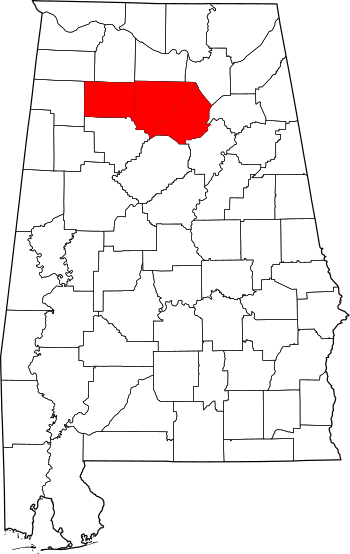Republic of Winston facts for kids
Quick facts for kids
Republic of Winston Informal
Winston County, Alabama Formal |
|
|---|---|

Map of Alabama highlighting Winston County as of 1861
|
|
| Historical era | American Civil War |
| Population | |
|
• 1861
|
3,450 (White) 122 (Slave)
|
| Today part of | Winston, Cullman, and Blount counties in Alabama |
The Republic of Winston, also known as the Free State of Winston, was an area in Alabama during the American Civil War. It included parts of what are now Winston, Cullman, and Blount counties. This region was known for not supporting the Confederate States of America, which was a group of southern states that broke away from the United States.
In Winston County, people strongly disagreed with the idea of leaving the United States. This disagreement sometimes led to fighting. After the war, a story grew that Winston County had actually seceded (left) from Alabama, just as Alabama had seceded from the United States. This story made the area famous.
Contents
Why Winston County Was Different
Winston County is in the northern, hilly part of Alabama. The soil there is not very good for large farms called plantations. Plantations usually grew crops like cotton and relied on the work of enslaved people. Because of the poor soil, Winston County did not have many enslaved people. In 1860, there were only 122 enslaved people compared to 3,450 white residents. Most people in Winston County were small farmers who worked their own land.
Standing Up for Neutrality
In January 1861, Alabama held a meeting to decide if it should leave the United States. Charles Christopher Sheats, a 21-year-old teacher, was Winston County's representative. He voted against Alabama leaving the Union and refused to sign the document that made it official. Sheats spoke out so much that he was arrested.
After he was released, Sheats became a leader for a group that wanted Winston County to stay neutral. This meant they didn't want to pick a side in the war. Later, Sheats openly supported the Union (the northern states) and spent much of the war in prison.
The Idea of Seceding from a State
A special meeting was held at a place called Looney's Tavern. There, the people of Winston County decided they did not want to be part of the war. They passed resolutions saying they would not support either side. One resolution even said that if a state could leave the United States, then a county could leave a state!
A man named Richard Payne, who supported the Confederacy, thought this was funny. He shouted, "Winston County secedes! Hoorah for the 'Free State of Winston'!" This is how the legend of the "Republic of Winston" began. Other places in the South, like Searcy County, Arkansas and Jones County, Mississippi, also had similar ideas. One area, the "State of Scott" in Tennessee, even officially tried to leave its state.
Many people in Winston County refused to join the Confederate Army. Some even talked about forming their own groups to help the Union. The state government in Alabama became worried. They tried to force people to join the army and swear loyalty to the Confederacy. But this only made people in Winston County more upset.
During the War Years
In April 1862, the Union Army moved into northern Alabama. Many people from Winston County who supported the Union joined the Union Army. They became part of the 1st Alabama Cavalry Regiment, led by an officer from New York named George E. Spencer. This group played an important role in the war, but mostly fought outside of Alabama.
During the war, between 8,000 and 10,000 soldiers who had left the Confederate Army (called deserters) found safety in Winston County.
After the War
After the American Civil War ended, the Republican Party became very strong in Winston County politics. This was different from most of the South, where the Democratic Party was more popular.
Winston County's Legacy
Winston County's special history has become a reason for people to visit. There's even an outdoor play based on the events. A boat on Smith Lake in the county is named the Free State Lady. In front of the Winston County courthouse in Double Springs, there is a statue called "Dual Destiny." It shows a young soldier dressed half as a Union soldier and half as a Confederate soldier, representing the divided loyalties during the war.
 | John T. Biggers |
 | Thomas Blackshear |
 | Mark Bradford |
 | Beverly Buchanan |

